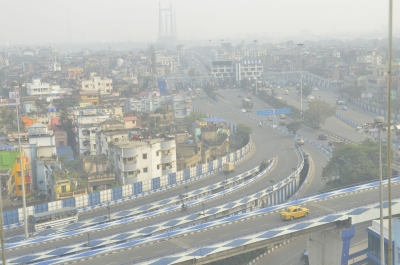Questions arise over limited AQI monitoring machines in Kolkata compared to Delhi, Mumbai
Questions arise over limited AQI monitoring machines in Kolkata compared to Delhi, Mumbai
IANS
File photo
Kolkata, Nov 27 (IANS) At a time when the air quality index (AQI) is deteriorating fast in Kolkata, questions are being raised about the limited number of CAAQMS machines, meant for monitoring AQI in different pockets of the city, compared to Mumbai and National Capital Region (NCR).
According to acclaimed green technologist and environment activist Somendra Mohan Ghosh, the total number of automatic Continuous Ambient Air Quality Monitoring Stations (CAAQMS) machines in Kolkata is just seven, compared to 35 in the NCR and 25 in Mumbai. This, according to him, deprives the public of getting a 360 degree picture of the pollution level scenario in the city.
He also claimed that although the West Bengal Pollution Control Board (WBPCB) promised installation of 10 additional automatic CAAQMS machines in the city last year, the same is yet to see the light of the day till date.
“These 10 are overdue for installation in some critical areas at Kolkata where air pollution levels are higher than average level and are pending since March 2022. The WBPCB knows the reason better but citizens are suffering,” he added.
Ghosh further pointed out that even some of the automatic CAAQMS machines in the city are at times non-functional with some being totally inactive and some showing wrong data.
City-based environment activist Naba Dutta too agreed with Ghosh that just seven automatic CAAQMS machines are simply not enough for a city like Kolkata, which is already among the top ten polluted cities in the world.
“Even as per standards of other national metros the number is too less. We had been for a long time interacting with the state government and the competent authorities on this count so that additional automatic CAAQMS machines were installed. But our efforts are yet to bear fruits,” Dutta added.
He also said that the issue of non-functional machines too has come to the notice of environmentalists. “We are actively pursuing to rectify these areas and our efforts will be on,” Dutta said.
Repeated attempts made by their correspondent to contact the West Bengal minister incharge of environment department Md Ghulam Rabbani failed. Both his mobile numbers were perpetually out of reach.
Environmental activists feel that LED displays are capable of displaying real time air quality data from CAAQMS stations using the data acquisition software at the central server.
“It displays current time and date via satellite and various weather and ambient air parameters such as CO, PM2.5, and PM10 along with calculated AQI from a local CAAQMS station setup by the Central Pollution Control Board. “Do not know whether it is international or non-intentional. Even if it is non-intentional, who will take the responsibility for it?” Ghosh questioned.

